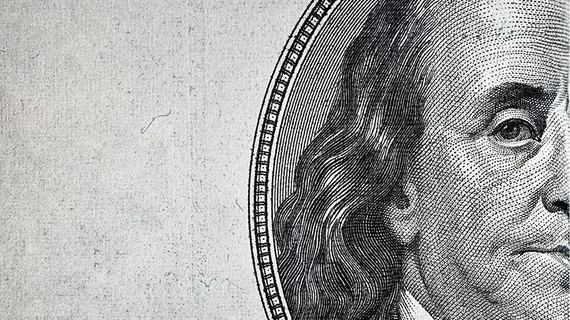Fitch Ratings adds Radiology Partners to list of top companies at risk of a debt default
Fitch Ratings has added Radiology Partners to its list of “top” companies that are at risk of defaulting on their bonds in the next two years, according to a recently published update.
The agency, which gauges investments relative to their likelihood of repayment, first added the country’s largest imaging group to its index on May 11. At the time, Fitch labeled its concern as “tier 2,” while citing “reports of weak operating performance resulting in declining liquidity.”
“The expansion of our Top Market Concern and Tier 2 lists compared to 2022 reflects the growing number of issuers facing liquidity pressures, including falling [earnings before interest, taxes, depreciation and amortization] and negative [free cash flow],” the New York-based agency said in its June 14 update. “It also reflects our expectation that more issuers will undertake restructurings that will be viewed as defaults (i.e., distressed debt exchanges) particularly as more debt becomes current, maturing within the next 12 months.”
Fitch Ratings has now added Rad Partners to its top-tier list alongside others such as Mallinckrodt Pharmaceuticals, which is facing lawsuits and ongoing pressure on its ratings. Some creditors are requesting that the drugmaker skip a June opioid settlement payment, while others are pushing for chapter 11. Meanwhile, Fitch has removed radiology provider Envision Healthcare and two other companies from its Top Market Concern list, following their bankruptcy filings.
In May, the agency estimated Rad Partners had $1.51 billion in outstanding bonds, with “weak liquidity” and the nearest maturity date looming on Dec. 15, 2025. Fitch also added fellow radiology provider Akumin Inc. to the list at tier 2, owing $850 million in outstanding bonds last month and the nearest maturity date arriving on Nov. 1, 2025.
Analysts estimated the overall industry default rate was 1.9% at the end of May. However, Fitch Ratings expects high-yield defaults to trend upward for the rest of 2023, hitting 4.5%-5% by year end. “Higher burden of interest expense, tighter lending conditions and more limited capital access resulting from stress in the banking sector and inflation uncertainty” all are fueling Fitch’s fears.
Its Top Market Concern Bond list dipped slightly from $53.3 billion in May down to $52.7 billion in June, with bankruptcy filings outpacing additions. Still, the figure is up markedly from $17.3 billion recorded in June 2022, “underscoring the deteriorating environment over the last year.”
“The Top Market Concern Bond list consists of [high yield] issuers we expect will default within two years,” the analysis noted. “Healthcare/pharmaceutical makes up the largest amount of the Top Market Concern Bond list at 34% of the total, followed by retail and telecom at 14% and 13%, respectively.”
Radiology Partners’ addition to the Top Market Concern list came a little more than a week after S&P Global Ratings downgraded its credit rating. An RP spokesperson could not immediately provide comment on the Fitch Ratings announcement late Thursday.
“Notwithstanding the economic and policy headwinds that radiology practices face and must be addressed, we remain committed to adapting to the current environment by reducing debt and strengthening our balance sheet through organic EBITDA growth," Rad Partners said earlier this month following the S&P downgrade.

